The McAuley Medal
Drawing inspiration from those who have striven to make a difference in our society locally, nationally and internationally, the College instituted an order of honour in 2008 to recognise people who have made an exceptional personal contribution to advancing the welfare of the community. This honour, the McAuley Medal, is the highest award that can be bestowed by the College.
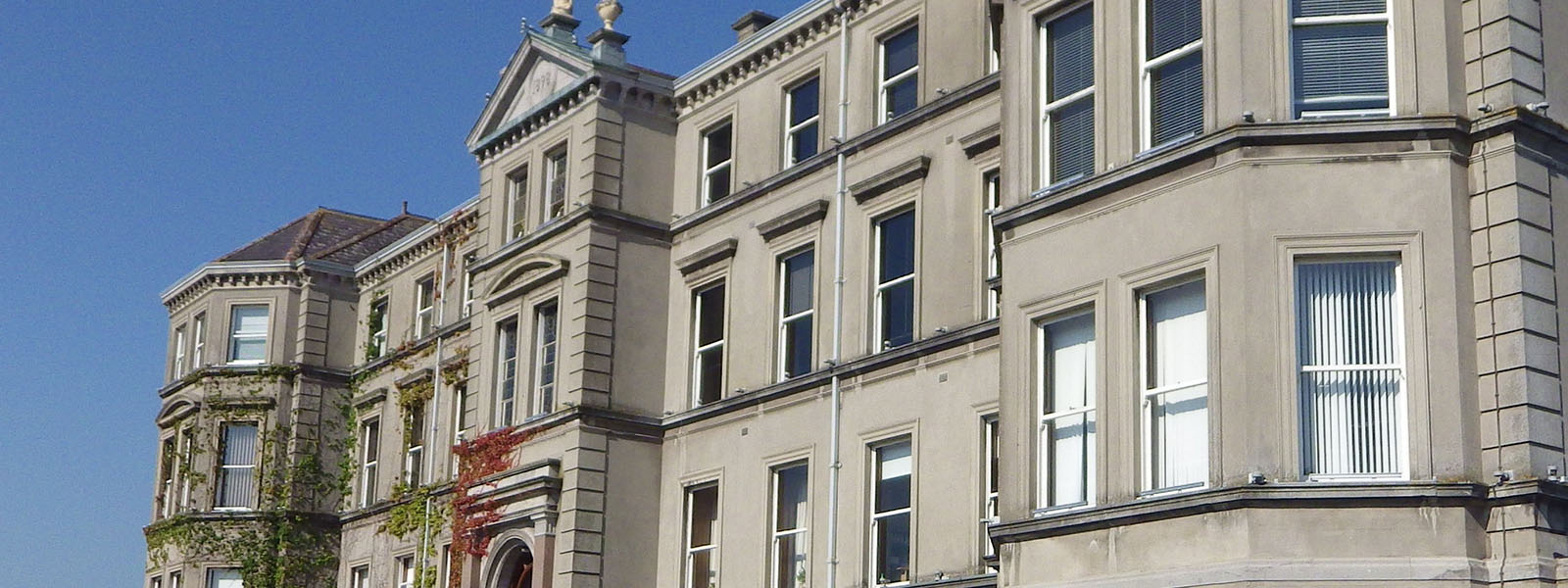
The McCauley Medal
It is named in memory of Catherine McAuley, the founder of the Catholic Sisters of Mercy, whose outstanding dedication to the most marginalised members of the community continues to inform the College’s ethos.
Those on whom this honour is bestowed are recognised by the College as torch-bearers, illuminating the ways in which a single individual can make an extraordinary and lasting difference in the lives of others. This is in sympathy with the College motto, Briathar Dé mo Lóchrann (Psalm 116) which in translation from the Irish language means: “The Word of God, a lamp for my steps”.
Recipients of the McAuley Medal may or may not have been associated with the College in the work for which they are honoured. Their good works will represent selfless service without expectation of material reward or public recognition.
The inaugural recipient of this award was the late Eunice Kennedy Shriver, honoured in 2008 in recognition of her outstanding and inspirational work in establishing the Special Olympics, growing it into a global movement and helping to fundamentally re-shape perceptions of people with disabilities. Other awardees include Imogen Stuart RHA, who was awarded the McAuley Medal in 2010, presented by the then Uachtarán na hÉireann, Mary McAleese, in honour of her lifetime contribution to the arts in Ireland and Fr Peter McVerry, founder of the Peter McVerry Trust, in recognition of his social justice activism.
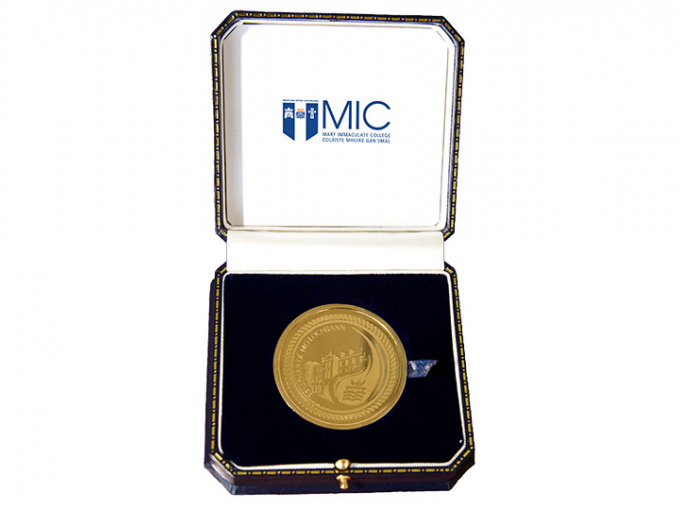
Some individuals have the power to make an extraordinary and lasting difference in the lives of others, Fr Peter McVerry is one of those individuals. Many young lives have been transformed and enriched by the work of the Peter McVerry Trust which has worked tirelessly, primarily, with young people and vulnerable adults offering pathways out of homelessness.
Fr Peter McVerry - Social Activist and Founder of the Peter McVerry Trust
Fr Peter McVerry is the 2022 recipient of the McAuley Medal, to be presented by President of Ireland, Michael D. Higgins, in recognition of his social justice activism.
Peter has worked in Dublin’s north inner city since 1974, where he came into contact with young people who were sleeping on the streets because of their home situation.
In 1979 he opened a hostel for homeless boys aged 12-16, this subsequently became his life-time work. He saw through the work of this hostel that when the boys reached 16 and needed to leave, they had few options open to them and most ended up back living on the streets. This realisation led him to set about providing services and accommodation for older youths. In 1980 Peter moved to Ballymun in north Dublin, and by the end of 1983 he had founded the Arrupe Society, a charity to tackle homelessness. This charity, which was subsequently renamed the Peter McVerry Trust, has progressed from a three-bedroom flat in Ballymun to becoming one of the country’s largest organisations responding to the issue of homelessness. The Trust is a national housing and homeless charity committed to reducing homelessness and the harm caused by substance misuse and social disadvantage.
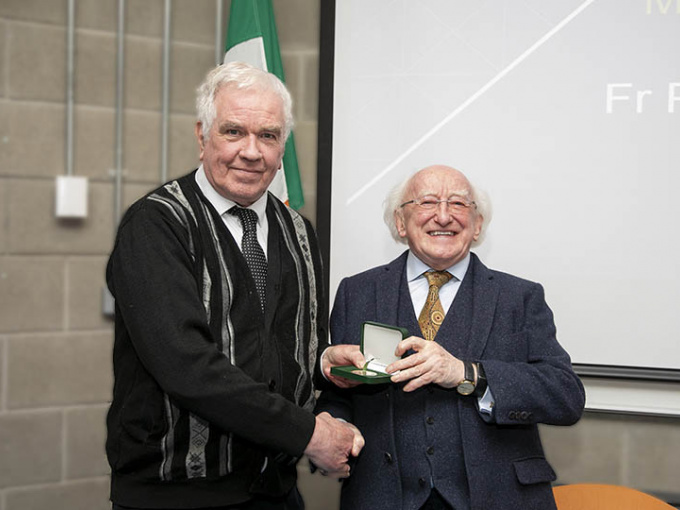

Imogen Stuart RHA - Lifetime Contribution to the Arts in Ireland
In honour of her lifetime contribution to the arts in Ireland, Imogen Stuart RHA was awarded the McAuley Medal from Mary Immaculate College in 2010, presented by the then Uachtarán na hÉireann, Mary McAleese.
Drawing inspiration from those who have striven to make a difference in society locally, nationally and internationally, the College instituted an order of honour in 2008 to recognise people whose vision and exceptional personal commitment to the good of the wider community has a truly pervasive impact. This honour, the McAuley Medal, is the highest award that can be bestowed by the College. It is named in memory of Catherine McAuley, the founder of the Catholic Sisters of Mercy, whose outstanding dedication to the most marginalised members of the community continues to inform the College’s ethos.
Eunice Kennedy Shriver – Founder of the Special Olympics
Eunice Kennedy Shriver was presented with the inaugural McAuley Medal in 2008 in recognition of her outstanding and inspirational work in establishing the Special Olympics. The late Prof. Peadar Cremin, President of Mary Immaculate College at the time, travelled to her home in Cape Cod, to present her with the award in the presence of the late Senator Ted Kennedy and his wife Vicky, Ethel Kennedy, the wife of the late Bobby Kennedy, Eunice’s daughter Maria Shriver, and sons Mark and Tim Shriver.
Eunice Mary Kennedy Shriver DSG (10 July 1921 – 11 August 2009) was an American philanthropist and a member of the Kennedy family. She was the founder of the Special Olympics, a sports organisation for persons with physical and intellectual disabilities.
Speaking about the presentation Prof. Cremin said, “The College is deeply honoured that Eunice Kennedy Shriver has agreed to be the inaugural recipient of the McAuley Medal. Like Catherine McAuley, Eunice Kennedy Shriver is a remarkable woman whose tireless commitment to the service of others is based upon a vision aimed at making a profound and lasting difference”.
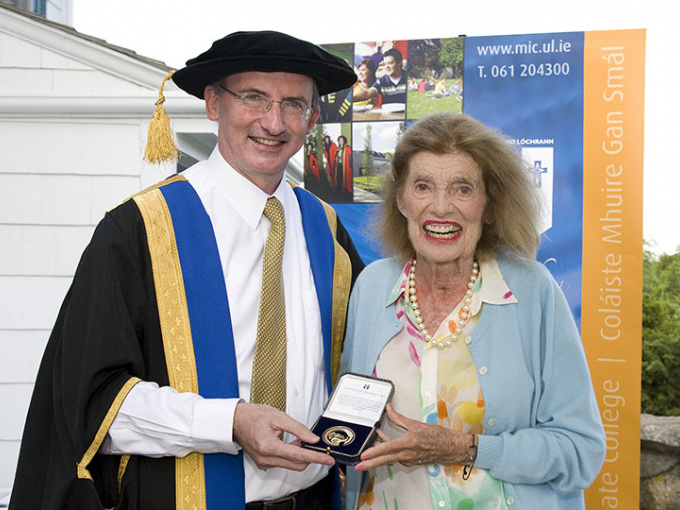
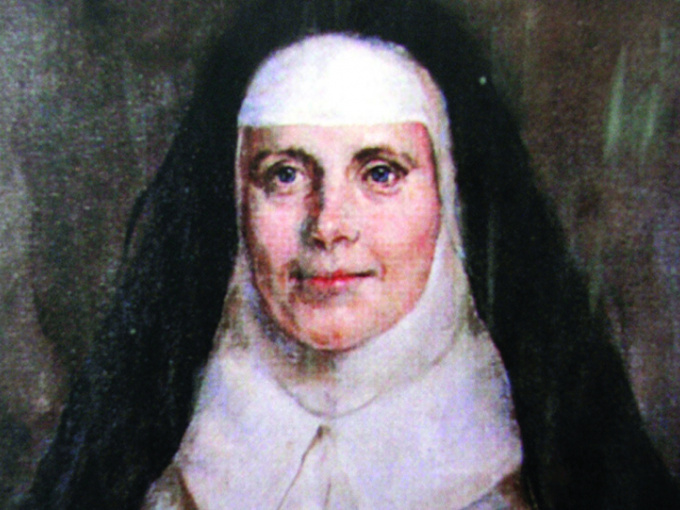
Catherine McAuley
Catherine McAuley was born to a wealthy Catholic family in Dublin, Ireland, in 1778. Catherine’s devout Catholicism was matched by an exceptional concern for the welfare of others, and especially for the care and education of children. She became guardian to five children following the deaths of her cousin and her sister, and also taught at a school for poor children in Dublin’s Abbey Street.
Left with a sizeable inheritance, Catherine devoted her wealth to the service of poor women and children in the city, establishing the House of Mercy in Baggott Street, Dublin, in 1827 as a centre for refuge and provision of education. Catherine’s particular interest in education prompted her to undertake a period of study in France to study educational methods which she introduced at Baggott Street, joined by a community of eleven other female volunteers.
In recognition of the spiritual character of the work led by Catherine McAuley at the House of Mercy, the Archbishop of Dublin and other advisors encouraged the women to establish a religious congregation. Following the taking of vows by Catherine and two others, the Sisters of Mercy came into being on 12 December 1831. The congregation was characterised by Catherine as a community that would strive “to educate poor girls, to lodge and maintain poor women who are in danger… and to visit the sick and poor".
By the time of her death on 11 November 1841, Catherine’s stewardship of the Sisters of Mercy had led to the rapid proliferation of communities, with eight established in Ireland and two more in England. There was a deliberate pattern to the choosing of locations for the Convents of Mercy; all were deeply affected by poverty. Today there are approximately 6,000 Sisters of Mercy working across the globe, carrying on Catherine McAuley’s vision of engagement with the most marginalised, the provision of refuge and the creation of better opportunities through education.



